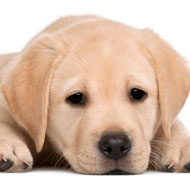
Potential students will be assessed on their ability to interact with pets
Edinburgh Napier University is introducing a novel method of ensuring that aspiring veterinary nursing students are suitable for the job.
New applicants to the popular course can expect to face a tough interview panel of dogs.
Fourteen-week-old Labrador puppy Belle, along with Labrador Ellie and terrier Holly, have been recruited to take part in the selection process, which will test each candidate's ability to mix well with pets before they are offered a place to train.
Belle’s owner, Dr Mary Fraser, is a veterinary nursing lecturer on this course. She said: “We get more than 400 applicants for our vet nursing course, which is the only degree of its kind offered in Scotland, and only have 30 places, so it’s really important to select those students who are right for the job.
“Having Belle in the interview room not only helps calm the prospective students but lets us see what they’re like with animals.”
The pups are brought in and allowed to roam the room while applicants answer questions about their qualifications and work experience.
Dr Fraser added: “All of our students go on to have work placements before eventually taking jobs in veterinary practices, so if, at this stage, they don’t cope well with a very friendly puppy then they are unlikely to get on well with a snarling 60kg dog. It is about rooting out these issues before they even get a foot in the door.”



 The RCVS has announced a new version of its 1CPD mobile app, with enhanced features for veterinary surgeons and veterinary nurses to record their continuing professional development.
The RCVS has announced a new version of its 1CPD mobile app, with enhanced features for veterinary surgeons and veterinary nurses to record their continuing professional development.